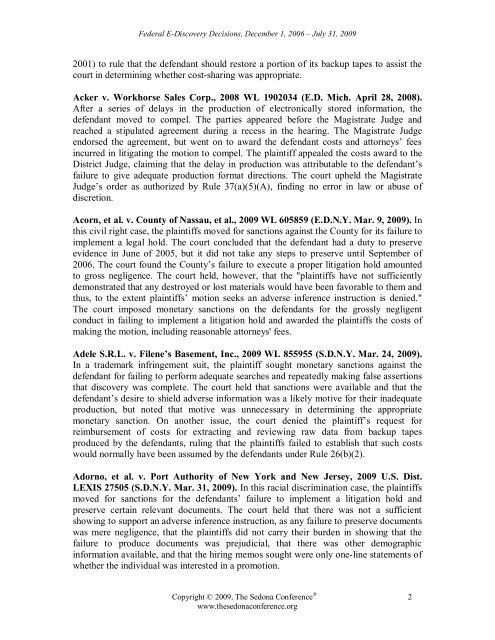Federal Court Decisions Involving Electronic Discovery, December 1 ...
Federal Court Decisions Involving Electronic Discovery, December 1 ...
Federal Court Decisions Involving Electronic Discovery, December 1 ...
Create successful ePaper yourself
Turn your PDF publications into a flip-book with our unique Google optimized e-Paper software.
<strong>Federal</strong> E-<strong>Discovery</strong> <strong>Decisions</strong>, <strong>December</strong> 1, 2006 – July 31, 2009<br />
2001) to rule that the defendant should restore a portion of its backup tapes to assist the<br />
court in determining whether cost-sharing was appropriate.<br />
Acker v. Workhorse Sales Corp., 2008 WL 1902034 (E.D. Mich. April 28, 2008).<br />
After a series of delays in the production of electronically stored information, the<br />
defendant moved to compel. The parties appeared before the Magistrate Judge and<br />
reached a stipulated agreement during a recess in the hearing. The Magistrate Judge<br />
endorsed the agreement, but went on to award the defendant costs and attorneys’ fees<br />
incurred in litigating the motion to compel. The plaintiff appealed the costs award to the<br />
District Judge, claiming that the delay in production was attributable to the defendant’s<br />
failure to give adequate production format directions. The court upheld the Magistrate<br />
Judge’s order as authorized by Rule 37(a)(5)(A), finding no error in law or abuse of<br />
discretion.<br />
Acorn, et al. v. County of Nassau, et al., 2009 WL 605859 (E.D.N.Y. Mar. 9, 2009). In<br />
this civil right case, the plaintiffs moved for sanctions against the County for its failure to<br />
implement a legal hold. The court concluded that the defendant had a duty to preserve<br />
evidence in June of 2005, but it did not take any steps to preserve until September of<br />
2006. The court found the County’s failure to execute a proper litigation hold amounted<br />
to gross negligence. The court held, however, that the "plaintiffs have not sufficiently<br />
demonstrated that any destroyed or lost materials would have been favorable to them and<br />
thus, to the extent plaintiffs’ motion seeks an adverse inference instruction is denied."<br />
The court imposed monetary sanctions on the defendants for the grossly negligent<br />
conduct in failing to implement a litigation hold and awarded the plaintiffs the costs of<br />
making the motion, including reasonable attorneys' fees.<br />
Adele S.R.L. v. Filene’s Basement, Inc., 2009 WL 855955 (S.D.N.Y. Mar. 24, 2009).<br />
In a trademark infringement suit, the plaintiff sought monetary sanctions against the<br />
defendant for failing to perform adequate searches and repeatedly making false assertions<br />
that discovery was complete. The court held that sanctions were available and that the<br />
defendant’s desire to shield adverse information was a likely motive for their inadequate<br />
production, but noted that motive was unnecessary in determining the appropriate<br />
monetary sanction. On another issue, the court denied the plaintiff’s request for<br />
reimbursement of costs for extracting and reviewing raw data from backup tapes<br />
produced by the defendants, ruling that the plaintiffs failed to establish that such costs<br />
would normally have been assumed by the defendants under Rule 26(b)(2).<br />
Adorno, et al. v. Port Authority of New York and New Jersey, 2009 U.S. Dist.<br />
LEXIS 27505 (S.D.N.Y. Mar. 31, 2009). In this racial discrimination case, the plaintiffs<br />
moved for sanctions for the defendants’ failure to implement a litigation hold and<br />
preserve certain relevant documents. The court held that there was not a sufficient<br />
showing to support an adverse inference instruction, as any failure to preserve documents<br />
was mere negligence, that the plaintiffs did not carry their burden in showing that the<br />
failure to produce documents was prejudicial, that there was other demographic<br />
information available, and that the hiring memos sought were only one-line statements of<br />
whether the individual was interested in a promotion.<br />
Copyright © 2009, The Sedona Conference ® 2<br />
www.thesedonaconference.org
















